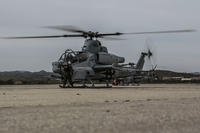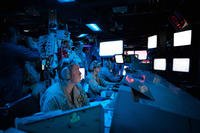Future generations will look on with amazement when we tell them that we survived the Tanker War.
The scandal ... the money ... the political grandstanding and gamesmanship ... it's been long enough since the saga ended that one almost doesn't even believe one's own memories: The ad blanketing by EADS and Boeing on every surface and screen in Washington. The hearings and speeches on Capitol Hill -- the charges and counter-charges of unfair business practices and subsidies. An unending tailspin of dysfunction. As we've observed, it would make a great movie -- though there are probably only a few hundred people who'd actually see it.
All that's dead and gone, Boeing seemed to say Friday, and everything today with its KC-46A tanker is hunky-dory. The company marked the year since it won the award with an announcement reaffirming that it's on track to execute its contract as agreed and deliver its first airplanes on schedule:
KC-46 Tanker program today marked the first anniversary of receiving a U.S. Air Force contract to build the next-generation aerial refueling tanker, the KC-46A. Over the past year, the program has completed key milestones in support of the design and development phase on or ahead of schedule, and is now preparing for a Preliminary Design Review (PDR) in March."The KC-46 program is on a good path. Boeing's performance thus far has been solid," said Maj. Gen. Chris Bogdan, KC-46 Program Executive Officer, U.S. Air Force. "Our commitment is to deliver the KC-46A to the nation's warfighters, on schedule and ready to go to war on day one, as the world's most advanced tanker. I'm pleased to report that Boeing is meeting its commitments."
Since receiving the contract on Feb. 24, 2011, the Boeing KC-46 team has completed several major milestones, including a System Requirements Review, Integrated Baseline Review, 767-2C PDR, and Firm Configuration Reviews for the 767-2C and the KC-46A Tanker.
"I'm very proud of our joint team," said Maureen Dougherty, Boeing KC-46 Tanker vice president and program manager. "We're drawing on the best of Boeing's industry-leading commercial airplane and defense expertise as we design and develop the KC-46A, which is a next-generation derivative aircraft. We remain on plan to deliver the first 18 combat-ready tankers by 2017."
The PDR, which will ensure that Boeing's design meets system requirements, will be followed by a Critical Design Review (CDR) in the third quarter of 2013. The CDR determines that the design of the KC-46A is mature and ready to proceed to the manufacturing phase of the program.
Boeing will build 179 next-generation aerial refueling tanker aircraft that will begin to replace the Air Force's fleet of 416 KC-135 tankers. Based on the proven Boeing 767 commercial airplane, the KC-46A tanker is a widebody, multi-mission aircraft updated with the latest and most advanced technology to meet the demanding mission requirements of the future, including a digital flight deck featuring Boeing 787 Dreamliner electronic displays and a flight control design philosophy that places aircrews in command to maximize combat maneuverability. The KC-46A also features a modernized KC-10 boom with a fly-by-wire control system, and a refueling envelope and fuel offload rate that is greater than the KC-135 it will replace.
To be sure, Boeing's first year hasn't been all tea and cakes -- the company announced it would close its plant in Wichita, Kansas, which was to have been instrumental in tanker production, and it became crystal clear that Big B is taking a bath on its early airplanes. The company's bid to defeat EADS was so low, and its actual costs could grow so much, that it may make no profit on the initial tankers for the Air Force. It will have to depend on good longer-term performance to recoup those costs, because the deal means it's responsible for all costs beyond the ceiling, and it can't just bill Uncle Sam. (Allegedly.)
Overall, however, DoD and Air Force officials probably breathe easier every day there's a tanker program, as opposed to open tanker warfare.








